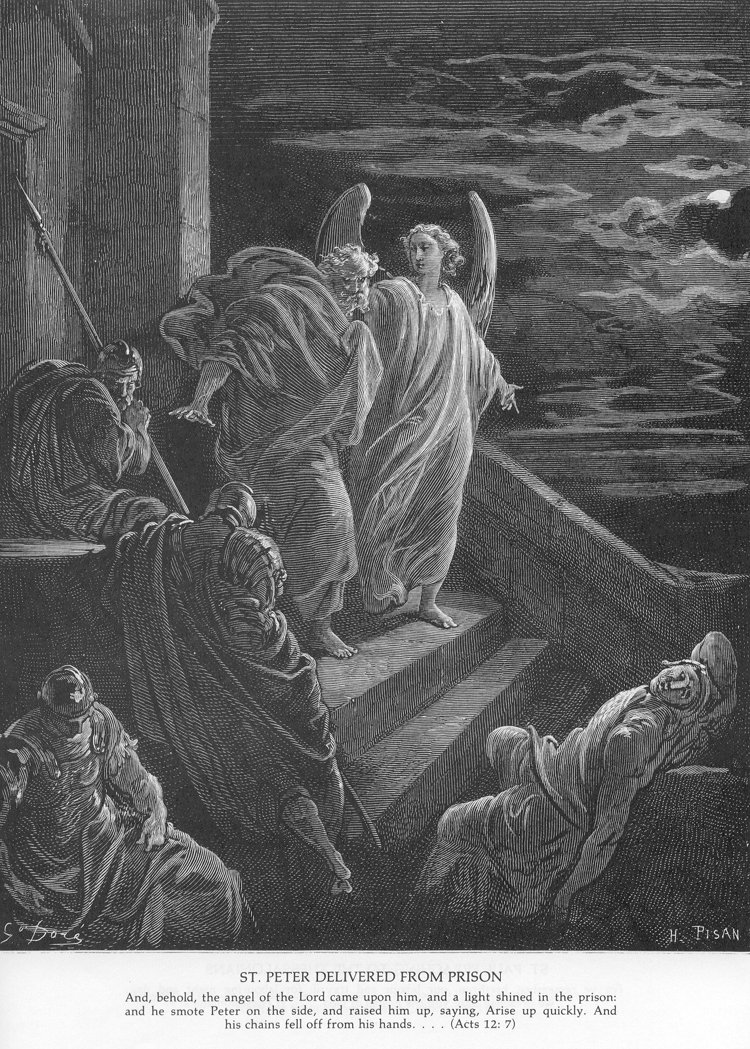Christians are in a situation of conflict in this world, and it must be so. This is not so much because we are to seek out conflict and actively pursue war with some enemy, but simply because we are aligned with Christ, and the world has rejected his claims to lordship. As he warned, because they have rejected him so also they reject us if we are truly his. (Perhaps here is the secret of rejoicing in suffering for Christ, for we may then be reassured that we are indeed with our Lord!)
In Acts 12, this innate conflict is brought to the fore, and personified in Herod and the early believers. The focus is not on the direct, violent conflict of prison and martyrdom, but on a deeper conflict of character (rooted ultimately in the parties' respective responses to Jesus and the Spirit). Herod is described in personal, individual terms: He had James killed. He seized Peter, put him in prison, handed him to squads of guards, and made further plans. He acts out of his own pride, for the sake of other people's favor, so that he might gain power. The church, though, is a corporate body acting out of faith and the life of the Spirit for the sake of Christ, that the gospel might be proclaimed.
Acting in faith beyond what they know, the church prays intensely for Peter when he is arrested by Herod. This is an outstanding picture of prayer as a practice--an activity that properly enacts the faith of the church, even when those in the church cannot wholly comprehend that faith in their minds.
They do know something: they know that an angel of the Lord has already freed Peter and others from prison once--they know the miraculous power of the God they serve--they know enough. But they also know the "severe persecution" that broke out with the stoning of Stephen, and the scattered, diasporic nature of their body as a result. They know that James, one of the three disciples closest to Jesus, was just killed by this same Herod. and that Peter's arrest rose out of the resultant crowd-pleasing blood-lust. They do not know of any earthly reason for Peter to escape death at Herod's hand.
They do not know, but still they pray. They may think Rhoda, the maid, is off her rocker when she says Peter is free and standing at the door, but yet they still bring the situation to the Lord in prayer. Despite their natural uncertainty and faltering hope, they pray fervently.
Their practice of prayer surges ahead of their cognition. Firm action precedes certain belief, and because God is faithful to his people (in this case he rescues Peter), their belief is brought up to speed with their faithful practice. As in Acts 4, the strength of the powers that be is stripped away, revealed as dross. Herod's end is follows this story; his failure to recognize his own limitation compared with God's ultimacy leads to his being struck down, eaten by worms, and dying. He practiced self-sufficient pride, and his end was a horrible death alone despite the adulation of the crowd.
Our regular practices in the church are essential to our beliefs and faith. In them, we perform our faith, not in the sense of acting like people would if they believed, but in the sense of giving flesh to belief. In the face of powers and principalities, floods and earthquakes, depression and disease, in the face of unemployment, persecution, or just plain ol' existential angst, our minds are given many reasons for concern, and our hearts may grow faint within us. In our culture and its obsession with being true to thyself and avoiding hypocrisy at all costs, we are urged at these times to act like we've given up--and thus, we do give up. The church's response in Acts 12, however, is of a different kind. They may not know that God will free Peter, but they know God, for they have seen Jesus. So they call on him in prayer to act on Peter's behalf. They enflesh faith in their practice of prayer, and their cognitive belief structures can only race to catch up--to explain what has already happened.
The interplay of belief and practice is mysterious indeed, but in encounters with God such as these, the division disappears, and all that is left is the church's life of faith, partnered with Christ to live and spread his Word in the world.
Subscribe to:
Post Comments (Atom)

1 comment:
Thank you for this! Thinking of faith being bolstered through practice, despite a reality that seemingly contradicts it is a great encouragement and challenge. The past few weeks I have been thinking about what my principles and convictions are; I've sadly seen myself make exception to them when it seemed they would cause inconvenience or offense to others, and I've seen myself become weakened and doubtful as I compromised my practices. Action and idea are inextricably bound. I want to have integrity, for my claims to sprout legs and walk the line articulated in word. Your post reminds me of another blog by a friend that I just read. If you are interested in checking it out you can find him here: http://nickpickrell.blogspot.com/2010/08/church-and-powers.html
Post a Comment